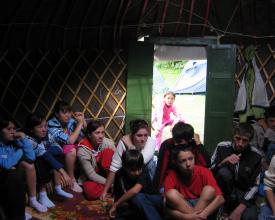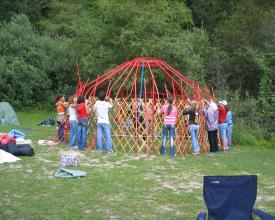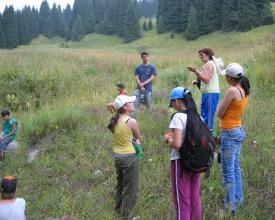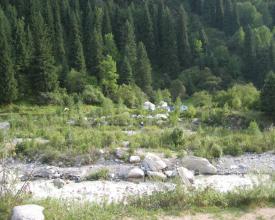L'impact de l'écotourisme sur le changement de perception d'une aire protégée
Solution complète

Les enfants écoutent l'éducateur sur l'écologie
Dilya Woodward
La réserve naturelle d'Almaty, au Kazakhstan, est une destination attrayante pour les écotouristes en raison de sa riche biodiversité, des infrastructures touristiques modernes de la ville voisine d'Almaty et des liaisons aériennes internationales. Bien qu'elle ait rencontré une certaine résistance locale lors de sa création en raison des restrictions imposées, une stratégie en trois volets axée sur l'environnement, l'éducation et l'engagement du public a permis d'améliorer les relations avec les communautés et la réserve accueille désormais des écotouristes chaque année ainsi que des événements écologiques annuels.
Dernière modification 29 Mar 2019
3598 Vues
Contexte
Défis à relever
Le principal défi dans la promotion des activités d'écotourisme dans la réserve est lié au manque de sensibilisation écologique de la population locale, aux niveaux de vie inférieurs à ceux des zones métropolitaines et à la perception négative de la zone protégée qui s'est formée en raison du régime de conservation.
Emplacement
Réserve naturelle d'Almaty, dans la ville de Talgar (près de la ville d'Almaty), Kazakhstan
Asie de l'Ouest, Moyen-Orient
Traiter
Résumé du processus
Les écocamps servent de plateforme de dialogue entre la population locale, c'est-à-dire les enfants de Talgar, et le personnel de la réserve. En participant à différentes activités dans l'écocamp, les enfants apprennent à connaître la biodiversité de l'aire protégée et les menaces qui pèsent sur les espèces menacées. Ils acquièrent également de nouvelles compétences, comme monter une tente, cuisiner sur le terrain, etc. Lorsque les enfants rentrent chez eux, ils parlent à leurs parents des activités auxquelles ils ont participé. Les parents, à leur tour, commencent à développer un lien avec la nature de la région dans laquelle ils vivent et se sentent favorables au personnel de la réserve pour le temps et les efforts qu'il consacre à l'éducation des enfants et à l'organisation d'activités pendant les vacances d'été. En impliquant différents acteurs et représentants des médias, l'image de l'AP et les principaux messages sont diffusés auprès d'un public plus large. La couverture médiatique aide alors le personnel de la réserve à se faire un profil qui, à son tour, permet d'obtenir des financements supplémentaires pour la recherche.
Blocs de construction
Établir des liens avec les écoles locales
L'objectif de ce module est d'impliquer les enseignants et les élèves des écoles locales dans la protection de l'environnement. Les membres du personnel de la réserve ont conclu un accord avec la direction des écoles locales pour intégrer des heures d'enseignement dans des matières telles que la biologie, l'écologie et l'étude de la nature par les membres du personnel de la réserve, ainsi que des visites planifiées au musée de la réserve. Le tandem entre les enseignants et les membres du personnel a permis non seulement d'améliorer l'éducation environnementale des écoliers, mais aussi d'utiliser le musée de la nature de la réserve comme lieu de cours pratiques pour les enfants, où ils étudient les animaux et les plantes de la région.
Facteurs favorables
Ouverture des membres du personnel de la réserve aux activités innovantes Bonnes capacités de communication des membres du personnel Capacité à influencer et à persuader les décideurs
Leçon apprise
La principale leçon à retenir est qu'il faut prendre contact avec les écoles locales dès le début de l'année afin qu'elles intègrent des cours dans la réserve dans leurs plans d'études et leurs programmes scolaires.
Ressources
Impliquer les parties prenantes, les représentants des médias et les autres AP
Le personnel de la réserve s'est engagé avec différentes parties prenantes sur une base stratégique et à long terme. Il s'agit notamment de Les directeurs d'écoles, les représentants des médias (y compris les médias nationaux), les sponsors (qui ont fourni des prix pour les compétitions des enfants). Les parties prenantes ont été invitées aux événements parce qu'ils répondaient à leur propre agenda et parce qu'elles étaient impliquées dans l'atmosphère de la célébration (musique, costumes traditionnels colorés, etc.).
Facteurs favorables
Vaste expérience et créativité des membres du personnel de la réserve Liens personnels avec les journalistes Passion des membres du personnel de la réserve pour leur travail
Leçon apprise
Il est important de maintenir de bonnes relations avec les parties prenantes - par exemple, envoyer des cartes de Noël, des cartes de célébration de Nauryz, etc.
Conservation d'espèces rares par l'écotourisme
Lorsque la population locale est suffisamment sensibilisée à l'écologie, elle comprend que la préservation des espèces rares de plantes et d'animaux attirera davantage d'écotouristes dans la réserve. C'est pourquoi les propriétaires de maisons d'hôtes participent activement aux programmes de développement de l'écotourisme, rénovent les maisons d'hôtes, produisent des souvenirs locaux, cultivent des légumes et des fruits locaux pour les vendre aux écotouristes. Parce que les habitants connaissent bien les sentiers de la réserve, ils savent où poussent les rares gouttes de neige, où se trouvent les sentiers des chèvres de montagne, leur soutien et leur "adhésion" sont très nécessaires à la conservation. Ce n'est qu'en unissant nos efforts que nous pourrons atteindre nos objectifs communs.
Facteurs favorables
Les conditions comprennent la poursuite de la promotion des avantages de l'écotourisme, la participation de la communauté locale aux événements de la réserve et, si possible, aux réunions de planification, le renforcement des capacités des propriétaires de maisons d'hôtes en matière de gestion des services, de cours de langue, de normes de sécurité alimentaire, etc.
Leçon apprise
s/o
Camp d'été écologique pour les enfants
L'écotourisme est strictement limité dans la réserve en raison de son caractère saisonnier. En hiver, l'écotourisme n'est pas possible en raison des tempêtes de neige et des chutes de neige. Au printemps, c'est la saison des avalanches. À la fin du printemps et tout au long de l'été, il y a des alertes aux tiques et un risque accru de coulées de boue. Par conséquent, la saison la plus appropriée pour les écotouristes est d'août à octobre. Plus de 1000 personnes ont visité la réserve en 2006. En 2003, le premier camp écologique a accueilli 100 étudiants pendant un mois en août. Depuis, la réserve accueille des écotouristes chaque année. Le nombre de participants varie entre 100 et 125 en une saison et à 35 en 2008. Les enfants qui viennent dans un écocamp profitent non seulement de la vie en plein air dans des tentes, mais ils apprennent aussi beaucoup sur la flore et la faune de la réserve grâce aux cours quotidiens donnés par le personnel de la réserve. À la fin de leur séjour, les enfants font part aux membres de leur famille et à leurs camarades de leurs impressions sur leur participation à l'écocamp par le biais de dessins, de questionnaires et d'histoires.
Le club écologique "Talhis" fonctionne dans la réserve depuis 2002. Ses principales activités visent à sensibiliser les jeunes à l'écologie, à travailler avec les communautés locales et à attirer l'attention des organismes compétents sur les questions environnementales.
Facteurs favorables
Les conditions favorables comprennent des bons subventionnés pour la participation des enfants à l'écocamp, la disponibilité du personnel expérimenté et compétent de la réserve et la disponibilité du transport et d'autres équipements tels que des tentes, des tables, des sacs de couchage, etc.
Leçon apprise
Nous avons appris qu'il est important de conclure à l'avance un accord avec une société de transport qui dispose de véhicules quatre par quatre. Par ailleurs, les premiers écocamps ont eu lieu en juin, mais ce mois n'est pas optimal pour les écocamps en raison de la menace de coulées de boue, des tiques et des basses températures dans les montagnes la nuit. Le mois optimal est le mois d'août. Lorsque les écocamps ont eu lieu en juin, tous les enfants ont dû être vaccinés contre la maladie de Lime. Lorsque les écocamps ont lieu en août, ces vaccins ne sont pas nécessaires.
Impacts
Les impacts positifs de l'écotourisme sont les suivants : - Collaboration plus étroite entre les membres du personnel de la réserve et les écoles et collèges locaux - Engagement plus profond de la population locale dans des initiatives telles que la Marche des parcs, la Journée des oiseaux, la Journée des perce-neige, etc.
- Meilleur niveau de vie de la population locale - Plus d'opportunités pour les locaux de développer de petites entreprises telles que la fabrication de feutres pour les souvenirs, la production laitière, etc. - Sensibilisation accrue à l'environnement des jeunes de la ville de Talgar - Moins d'implication de la population locale dans des activités illégales (cueillette d'espèces de plantes menacées et capture d'espèces sauvages) Un exemple de l'impact comprend des initiatives importantes telles que la "Marche pour les parcs" :
Depuis 1996, les membres du personnel participent activement au rassemblement international "March for Parks". Cette initiative est passée d'un événement d'un jour à un événement d'envergure nationale qui attire l'attention des médias et touche plus de 10 000 personnes en deux mois. En 2010, la réserve naturelle d'Almaty a remporté le premier prix et en 2011, les membres du personnel ont reçu un autre prix, celui du meilleur film.
Bénéficiaires
Autorités gouvernementales, administration de la réserve, membres du personnel de la réserve, population locale, enseignants et étudiants.
Histoire
Dans la ville de Talgar, il y a un petit paradis avec des roses, des jardins fruitiers et des potagers entourés de sapins et habités par des écureuils, des faisans et des hérissons. Les propriétaires de ce paradis sont des enfants - de jeunes naturalistes de la "Société des jeunes écologistes" et leur chef depuis 25 ans - Mamed Makhmudov. M. Makhmudov et ses jeunes écologistes sont bien connus dans la région et à l'étranger. Ils remportent fréquemment des festivals, des concours, des forums et des compétitions scientifiques. Aucun événement de la ville ne se déroule sans leur participation. Le terrain de 3 ha, ancien monastère à l'époque pré-soviétique, est un monde à part entière. Chaque élève a ses devoirs : soigner les fleurs, creuser la terre, arroser les légumes. Les enfants se relaient afin de développer diverses compétences. 700 membres font actuellement partie de l'association. Mais le terrain est trop petit pour accueillir tous les membres en même temps. Par conséquent, 20 à 30 enfants en moyenne viennent chaque jour. M. Makhmudov remarque : "En établissant des liens étroits avec les plantes et les animaux, les enfants ouvrent leur véritable âme, ils deviennent plus gentils, passionnés et honnêtes. Beaucoup d'entre eux viennent de familles défavorisées. Pour moi, le plus important est que les enfants sentent qu'ils apportent des changements positifs à la société et que leur travail est nécessaire". Artur Albrant étudie le type indigène de pommes "Aport" depuis 5 ans et recherche le comportement des abeilles sauvages. Ilya Sheglov est le lauréat du concours national de la petite académie des sciences. Il étudie le saule pourpre, une espèce autochtone des montagnes de Talgar.
Les jeunes écologistes se préparent à l'événement le plus attendu de l'année : le traditionnel écocamp dans la réserve d'État d'Almaty. C'est une période qui n'est pas seulement remplie d'amour pour la randonnée, la natation dans les ruisseaux de montagne et d'autres attributs de la vie en camp dans les montagnes. Un travail de recherche actif est mené sous la supervision du personnel de la réserve et du parc national de l'Île-Alatau. Les membres du personnel de la réserve s'occupent de la sécurité des enfants, du transport et de l'équipement (en partie) selon un accord tripartite entre la réserve, le parc national et la société.
Environ 70% des diplômés de la Société deviennent enseignants, médecins, biologistes, gardes forestiers. Par exemple, Zh. Dirbayeva et K. Pichugina ont remporté le concours scientifique national "Daryn" et ont reçu des bourses pour étudier à l'université de médecine. Les jeunes naturalistes sont les étudiants les plus reconnaissants et ils sont la mission de ma vie", a déclaré Mamed Makhmudov.
Connexion avec les contributeurs
Autres contributeurs
Dilya Woodward
Université nationale kazakhe Al-Farabi
Mme Alexandra Vishnevskaya
Réserve naturelle d'Almaty





